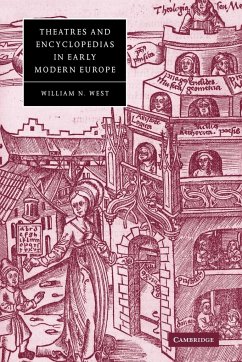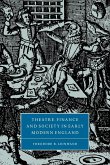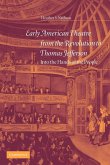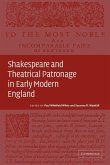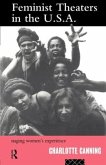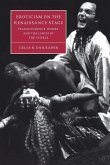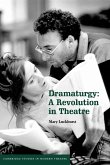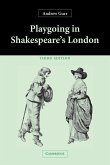Places Renaissance drama within the cultural context of the encyclopedic texts written at the time.
In this book West explores what 'theatre' meant to medieval and Renaissance writers and places Renaissance drama within the influential context of the encyclopedic writings produced at the time. It was an encyclopedic culture, obsessed with sorting knowledge, and early encyclopedias presented themselves as textual theatres, in which everything knowable could be represented in concrete, visible form. Medieval and Renaissance plays, similarly, took encyclopedic themes as their topics: the mysteries of nature, universal history, the world of learning. But instead of transmitting authorized knowledge unambiguously, as it was supposed to be, the theatre created a situation in which ordinary experience could become a source of authority. West covers a wide range of works, from the encyclopedic texts of the Middle Ages and Renaissance to Marlowe's Dr Faustus, Jonson's The Alchemist, and Bacon's Novum Organum, to provide a fascinating picture of the cultural life of the period.
Review quote:
''- At the heart of every encyclopaedic effort is the desire to marvel,' West comments, and this sense of awe is mirrored in his own engaging explication of the processes of wonder construction. It comes out through the densely argued examples and the splendid illustrations of fantastic beasts and performances spaces. Curiositas, 'the lust of the eyes', which links passion for knowledge to the watching of 'shows', works its dangerous magic through the majority of this fascinating book.' Journal of New Theatre Quarterly
Table of contents:
List of illustrations; Acknowledgements; Note on texts; Introduction: circles of learning; 1. The space of the encyclopedia; 2. The idea of a theatre; 3. Tricks of vision, truths of discourse: illustration, ars combinatoria, and authority; 4. Holding the mirror up to nature?: the humanist theatre beside itself; 5. The show of learning and the performance of knowledge: humors, Epigrams, and 'an universal store'; 6. Francis Bacon's theatre of Orpheus: 'literate experience' and experimental science; Notes; Bibliography; Index.
Hinweis: Dieser Artikel kann nur an eine deutsche Lieferadresse ausgeliefert werden.
In this book West explores what 'theatre' meant to medieval and Renaissance writers and places Renaissance drama within the influential context of the encyclopedic writings produced at the time. It was an encyclopedic culture, obsessed with sorting knowledge, and early encyclopedias presented themselves as textual theatres, in which everything knowable could be represented in concrete, visible form. Medieval and Renaissance plays, similarly, took encyclopedic themes as their topics: the mysteries of nature, universal history, the world of learning. But instead of transmitting authorized knowledge unambiguously, as it was supposed to be, the theatre created a situation in which ordinary experience could become a source of authority. West covers a wide range of works, from the encyclopedic texts of the Middle Ages and Renaissance to Marlowe's Dr Faustus, Jonson's The Alchemist, and Bacon's Novum Organum, to provide a fascinating picture of the cultural life of the period.
Review quote:
''- At the heart of every encyclopaedic effort is the desire to marvel,' West comments, and this sense of awe is mirrored in his own engaging explication of the processes of wonder construction. It comes out through the densely argued examples and the splendid illustrations of fantastic beasts and performances spaces. Curiositas, 'the lust of the eyes', which links passion for knowledge to the watching of 'shows', works its dangerous magic through the majority of this fascinating book.' Journal of New Theatre Quarterly
Table of contents:
List of illustrations; Acknowledgements; Note on texts; Introduction: circles of learning; 1. The space of the encyclopedia; 2. The idea of a theatre; 3. Tricks of vision, truths of discourse: illustration, ars combinatoria, and authority; 4. Holding the mirror up to nature?: the humanist theatre beside itself; 5. The show of learning and the performance of knowledge: humors, Epigrams, and 'an universal store'; 6. Francis Bacon's theatre of Orpheus: 'literate experience' and experimental science; Notes; Bibliography; Index.
Hinweis: Dieser Artikel kann nur an eine deutsche Lieferadresse ausgeliefert werden.

